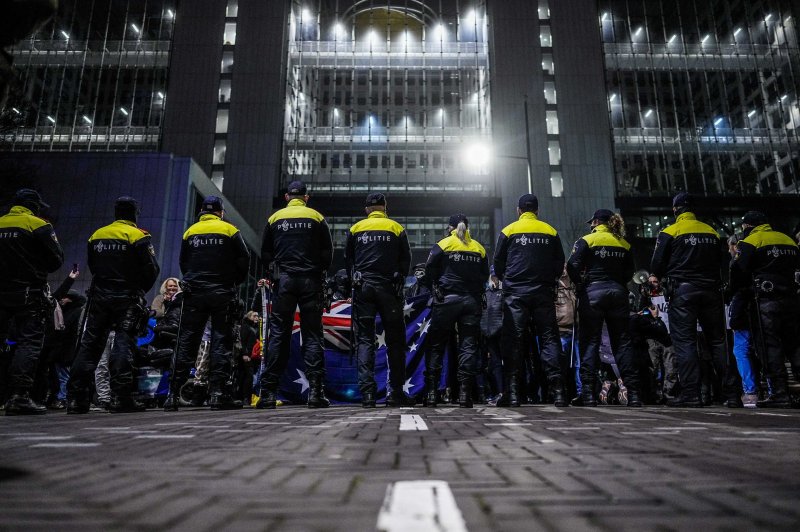1 of 2 | Police in The Hague, Netherlands, confront people protesting against the Dutch government's move on Saturday to institute a hard lockdown through at least January 14 to curb the rapid spread of the Omicron variant. Photo by Phil Nijhuis/EPA-EFE
Dec. 18 (UPI) -- European leaders reacted to the quickly spreading Omicron variant on Saturday with a hard lockdown in the Netherlands, the declaration of a "major incident" emergency in London and other measures.
Dutch Prime Minister Mark Rutte announced that starting Sunday and lasting through at least Jan. 14, schools and colleges, all non-essential shops and cultural institutions will be shuttered.
"It has become clear in the past week that the Omicron variant is spreading very rapidly in the Netherlands too," the government said in a statement. "The Outbreak Management Team expects that this variant will be the dominant variant in the Netherlands by the end of December. This is sooner than previously expected."
The lockdown is being instituted to keep the Netherlands' healthcare system from becoming overburdened in January, officials said, adding, "the spread of the Omicron variant must be slowed as soon as possible in order to ensure healthcare services remain available to all."
Under the rules, all indoor sports will stop immediately while outdoor sports can continue up until 5 p.m. Professional sports matches will continue without spectators. The only other events allowed to go ahead will be funerals and weekly outdoor grocery markets.
In London, Mayor Sadiq Khan made the decision to declare a rare "major incident" in the city after the British Health Security Agency reported an alarming 10,059 new cases of the Omicron variant and nearly 25,000 overall COVID-19 cases for Friday -- the highest number since the start of the pandemic.
The number of COVID-19 patients in London hospitals has risen 29% in the last week while the number of deaths from Omicron across Britain rose to seven from a previous figure of one, according to the HSA.
"The surge in cases of the Omicron variant across our capital is hugely concerning, so we are once again declaring a major incident because of the threat of COVID-19 to our city," the mayor said.
The variant, he added, "has quickly become dominant with cases increasing rapidly and the number of patients in our hospitals with COVID-19 on the rise again. We are already feeling the impact across the capital and while we are still learning about this variant, it's right that London's key agencies work closely together to minimize the impact on our city, including helping to protect the vital vaccination program."
A "major incident" declaration is a rarely used tool for "an event or situation with a range of serious consequences" which requires emergency responders to implement special arrangements.
Khan also declared a "major incident" last January due to the rapid spread of COVID-19 and its impact on the National Health Service. He lifted it the following month as case numbers fell. Other such declarations have previously been called for the Grenfell Tower fire and the terror attack at Westminster Bridge in 2017.
The rapid spread of Omicron triggered a range of reactions across Europe.
In announcing new measures on Friday, French Prime Minister Jean Castex said the Omicron variant is "spreading at lightning speed" in Europe and will likely become dominant in France by the start of next year.
He said the government will submit a bill in early January to transform the health pass, which can currently be obtained from a negative COVID test or vaccination, into a vaccination-only pass, Politico reported.
The prime minister said he wants "only the vaccination...to be valid," as "the intensive care...units of our hospitals are filled for the most part with unvaccinated people."
He also announced that the waiting time before getting a vaccine booster would be reduced from five months to four months starting on Jan. 3 and he urged French citizens to get a COVID-19 test before attending Christmas and New Year's gatherings.
The French leader also said that local authorities will prohibit "large gatherings in the street, notably fireworks or concerts."
In Germany, state and local health ministers are calling for stricter rules for entering Germany from variant-hit countries to slow the spread of Omicron, the German news agency DPA reported.
They want all travelers from areas where Omicron is prevalent to provide a negative PCR test, rather just a rapid antigen test, before departing for Germany.
German health authorities have tagged neighboring France and Denmark, along with Andorra, Lebanon and Norway, as "high-risk" areas, meaning people who are not vaccinated or have not recently recovered from COVID-19 are required to quarantine for at least five days.
Denmark's health ministry announced Friday it will close all cinemas, theaters and concert halls, along with amusement parks and museums, and restrict restaurant opening hours after a record number of daily cases.
And in Ireland, Prime Minister Michael Martin said hospitality businesses in the country, including pubs and restaurants, would have to close their doors at 8 p.m. during the Christmas period, The Irish Times reported.















